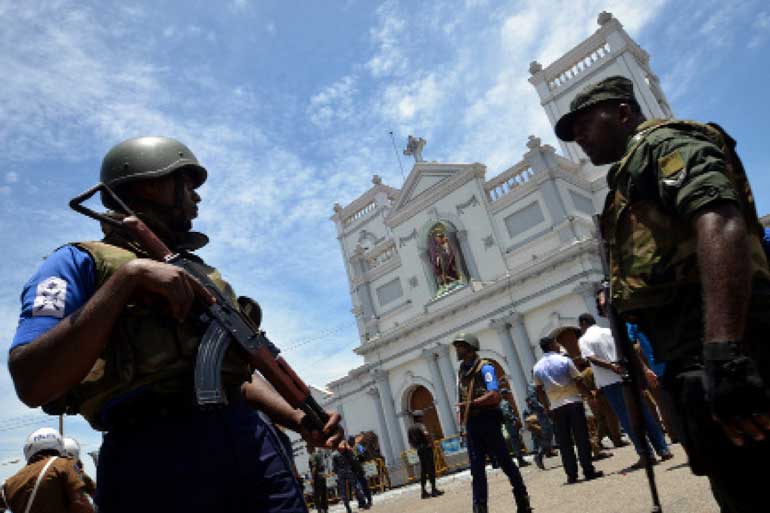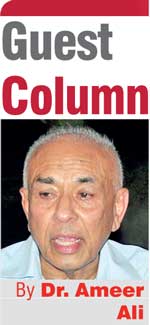Tuesday Feb 17, 2026
Tuesday Feb 17, 2026
Saturday, 19 June 2021 00:05 - - {{hitsCtrl.values.hits}}

The fear now is that the regime, because of failures on multiple fronts and increasing popular discontent as a result, may, in a state of desperation, recall to life memories of the bloody Easter Sunday to cause another wave of communal violence to deflect people’s anti-regime anger on to the Muslim community – Pic by Shehan Gunasekara
 It has been over two years and two months since the Easter Sunday mayhem on 21 April 2019 killed 268 innocent Christian worshipers, damaged three churches and three five-star hotels, and brought lifelong distress to many a Christian family.
It has been over two years and two months since the Easter Sunday mayhem on 21 April 2019 killed 268 innocent Christian worshipers, damaged three churches and three five-star hotels, and brought lifelong distress to many a Christian family.
The killers – a fanatical fringe of Islamists headed by a madrasa reject and backyard preacher – were hunted down and killed by security forces, and the Muslim community, which was left aghast, condemned the killers unreservedly. Yet, it was subject to collective punishment in the hands of unruly mobs, all under full view of the same State security forces. All that the Muslim community could do was to inflict the severest punishment it could think of in denying Islamic burials to the slayers of Christian worshippers.
Two separate investigations under two separate regimes were carried out. They produced two reports, of which the second by the Presidential Commission ran into 100,000 words in 22 volumes. When it was handed over to President Gotabaya Rajapaksa (GR) he appointed a select committee to study that report and make recommendations for State action. Copies were also delivered to the Attorney General (AG), Dappula de Livera, and to the Catholic Archbishop, Malcolm Cardinal Ranjit.
From that report, the AG discovered a “grand conspiracy” behind the Easter attacks and pointed out to “certain elements”, which had not been investigated. This was an indictment on the investigators. Perhaps based on AG’s revelation and from his own reading of the report(s), and later, from revelations made in the Parliament by a member from the Opposition, who referred to one “Sonic-Sonic” with whom one of the killers seem to have had contact just before detonating his killer-device, the Cardinal demanded from the President to reveal the details of the “mastermind” behind the massacre.
Had there been no mastermind at all the President could have said so immediately and cleared the air. But the Minister of Public Security Sarath Weerasekera rushed to reveal that Moulavi Muhammad Noufer was the mastermind, which was immediately disputed by AG Dappula. Even the FBI called Noufer the second Emir. If so, who was the first?
However, what is surprising after all farrago about the mastermind, 704 arrests, 203 in remand custody, 84 under detention, 244 on bail, 168 released and 32 indicted (Sunday Times, 23 May 2021), the whole episode, and controversies over its investigations seem to be disappearing from public attention, leading to suspicion that as far as the regime is concerned the massacre has served its purpose and the country can move on regardless, like it did after all hoo-ha about the bond scam.
That purpose was to promote security as the number one issue in the contest for political power. The security issue also became handy for the successful President Gotabaya Rajapaksa (GR) to install a de-facto military state, by deploying security personal as heads of numerous task forces and civilian administration, including the management of the pandemic.
Currently, no one seems to be bothered about the Easter Sunday investigation except the Catholic Cardinal. A deteriorating economic situation and persisting pandemic have made it convenient for the regime to ignore the Easter massacre. The question is, will the forgotten episode be resurrected later when public discontent against the regime intensifies?
The economy will remain enemy no. 1 for the foreseeable future even if the pandemic disappears miraculously overnight. The disruption that COVID-19 has already caused to ordinary economic activities will take at least another year to be rectified and reach a new normalcy. Even then, unless there is vigorous growth in economies of Sri Lanka’s trading partners, growth prospects for the island will remain dismal.
The revised forecast of 5% growth for 2021 by the Governor of Central Bank is extremely optimistic and dreamlike. If at all there is going to be any positive economic growth it would not exceed 2%, ceteris paribus.
To make matters grave, the looming threat of the EU’s withdrawal of GSP preferential tariffs on Sri Lankan exports will strike a severe blow to any prospect of economic revival. The EU is Sri Lanka’s second largest destination for her exports, and it is not easy to switch to another destination to balance the loss.
Professor Lakshman desperately urges the country’s diplomats to do everything possible to stop EU from acting on its threat. But the poor Professor should realise that it is not in the hands of the diplomats but in those of the rulers at home that measures should be taken to prevent this happening.
The EU resolution comes in the wake of the Human Rights resolution in Geneva and reinforces the stipulations spelt out in that resolution. This time the European Parliament doesn’t even have to go to Brussels to get approval for implementing its resolution. Without repeating the hackneyed blame on “vanquished Tamil separatists,” constructive measures need be taken at home to bring about post-war reconciliation and forge national unity.
Realistically, it is the economy that demands this reconciliation and unity more than European Union and UNHCR. It may be politically wise for rulers to keep communities divided to stay in power. But it is detrimental for economic growth and development.
Unfortunately, the prevailing political environment manipulated by Buddhist ethno-religious nationalists seem to believe that the country could achieve an economic miracle, sans minorities. It is a pity that pundits who advice the regime on economic matters continue to ignore this vital aspect of development. Currently, because of continuous discrimination and injustice, politically as well as administratively, both minorities feel that they are being deliberately left out of the growth equation.
Coming back to the mastermind farrago, virtually all those who have been interrogated by the CID and security forces in connection with the massacre are Muslims. None have been produced before the court and no credible evidence has yet been dug out to indict them. Reports are leaking out that several of them in custody are being tortured to confess admission of guilt or provide information to implicate someone else.
The classic case in this context is that of the young Muslim poet, Ahnaf Jazeem, arrested under the PTA on a bogus charge of spreading extremism through his poetry. This was found to be untrue, and now we are told that he is tortured to confess that Jaamiya Naleemiya, a premier Muslim educational institution, had been indoctrinating extremist ideas to its students. Jazeem’s father too had been harassed to force his son to confess to that false crime. The policy seems to be to arrest first and then look for evidence.
While harassing the Muslim community with arbitrary arrests, bans and restrictions, no action has been taken yet against the anti-Muslim groups that were identified by the PCoI report and which were found creating and environment which led to that massacre. It appears that they have been left untouched because of their usefulness in time to come.
(The writer is attached to the School of Business& Governance, Murdoch University, Western Australia.)